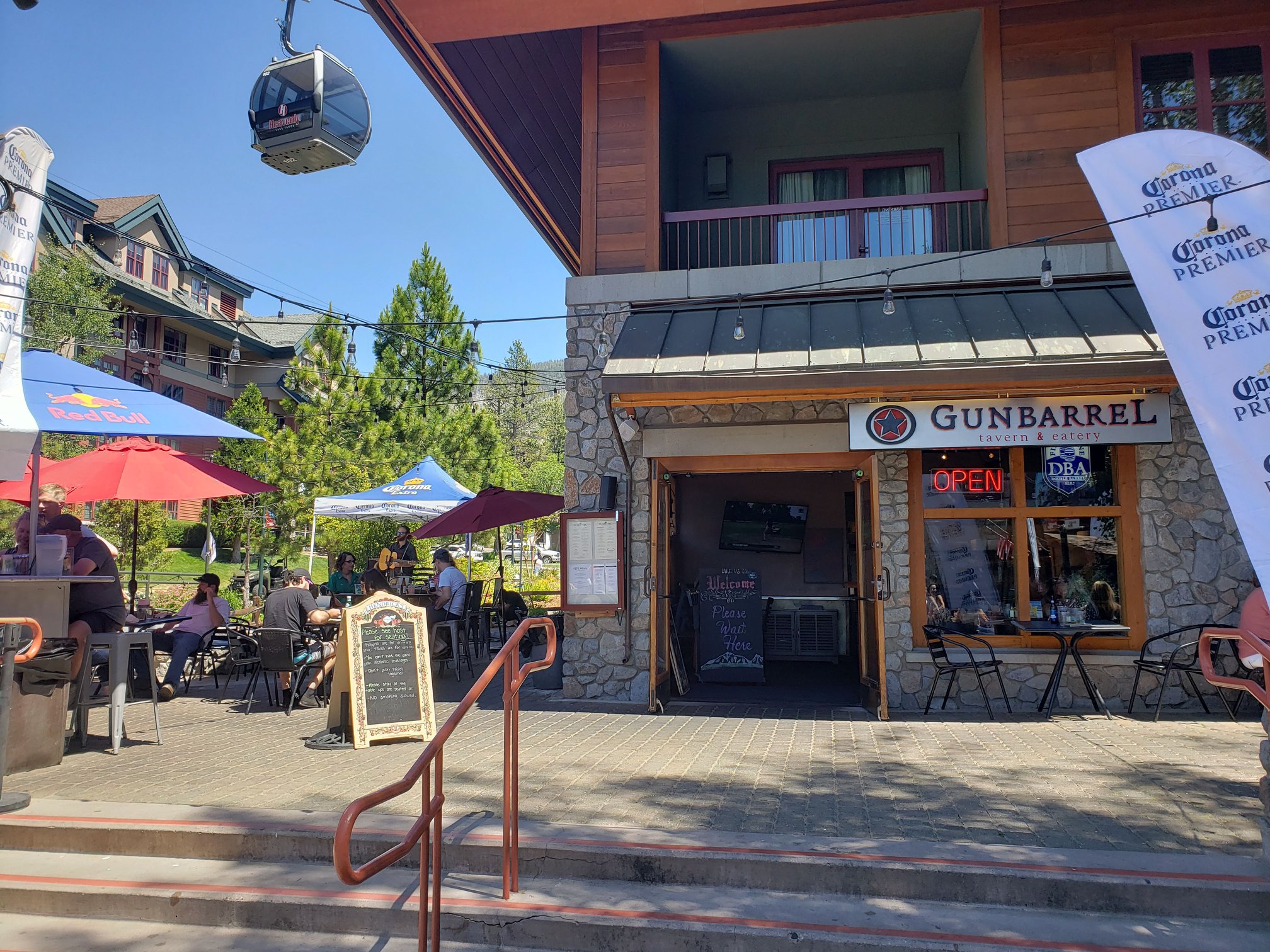
The impact of climate change
We are finding, coaching and training public media’s next generation. This #NPRNextGenRadio project is created with the University of Nevada, Reno, where five talented reporters are participating in a week-long state-of-the-art training program.
In this project we are highlighting the experiences of people whose lives are being affected by climate change.
Owen Christopher speaks with restaurateur Alex Cox, who was forced to close his South Lake Tahoe location last year, when smoke from the Caldor fire prompted an evacuation. Now that he’s back in business, Cox struggles with how to prepare his restaurants and his family against the increasingly prevalent threat of climate change.
Illustration by Ard Su
Lake Tahoe restaurateur confronts climate change for his business and his family
Last summer, Alex Cox watched as the Caldor fire engulfed South Lake Tahoe in dangerous levels of smoke. He owns two restaurants in the area and had to shut down his businesses with no idea when he would be able to open again. The wildfires have gotten progressively worse every year. Besides the threat to his livelihood, what worried him the most was protecting his older father and newborn child.
Cox had recently moved his father to South Lake Tahoe to help with his restaurants. But when the smoke started to get worse he began to fear for his father’s life.
“It was scary, you know and we were kind of playing it day by day hour by hour and I remember when it got close I was worried, you know is a dense Bank of smoke gonna come in and suffocate him in the night before he has a chance to get out of there,” Cox said.
Lake Tahoe restauranteur confronts climate change for his business and his family

Alex Cox, the owner of a pair of restaurants in Lake Tahoe, poses in front of his truck parked at the University of Nevada-Reno. As the wildfire season approaches, he tries to prepare his businesses for the smoke. (Photo by Owen Christopher)
To prepare for the upcoming fire season, Cox has had to invest in air purifiers and indoor seating. Considering the severity of the wildfires in the area, there isn’t much else he can do.
Tourism is a big part of Cox’s businesses. His restaurants are in a skiing hotspot where people come to experience winter sports. Climate change has affected the volume of snowfall and ski resorts have been forced to compensate with fake snow. If things continue to worsen, it could seriously affect the amount of people that visit Cox’s restaurants. Between this and the smoke, Cox worries about his business going into the future.
Since he started his restaurant, Cox has taken pride in his use of organic local ingredients. With extreme weather patterns increasing globally, local food production is one way restaurants are fighting food shortages.
“We promote and use a lot of the Tahoe food hubs like organic local businesses,” Cox said. “So it’s not food coming from Chile that just was on a boat for 10,000 miles. It was something that somebody grew down in Auburn [California] in a little organic backyard garden kind of thing.”
Cox cares about his child’s future. He wants to teach his daughter about the seriousness of climate change without scaring or overwhelming her. He knows it’s a battle future generations will struggle with and he wants his own child to be prepared.
“How do you set the scene for that without scaring their pants off that there’s this monster in the closet that’s gonna get them called climate change. I think that’s something every parent has to address,” Cox said. “Because it’s here and it’s real and it’s the world that we’re giving them.”

Gunbarrel Tavern serves its patrons in South Lake Tahoe in March of 2020. Alex Cox will have to shut this restaurant down in just over a year due to smoke from the Caldor fire. (Photo courtesy of Alex Cox)
Transcript
ALEX COX: My name is Alex Cox and I have a couple of businesses up in Tahoe. They’re both restaurants in the ski resorts and around Lake Tahoe.
We were evacuated during the Caldor Fire and had to close down for a couple of weeks.
I live here in Reno, but my dad, I just moved him out to help out with the restaurant and he lived there and I had to evacuate him for a little bit and it was scary.
And we were kind of playing it day-by-day hour-by-hour and I remember when it got close I was worried. You know a dense bank of smoke’s gonna come in and suffocate him in the night before he has a chance to get out of there.
I remember right before the evacuation happened, they were looking at smoke levels around my business that were close to a thousand parts per million, which is for anyone that knows or tracks to smoke in the summer, it’s pretty bad.
COX: It took actually a long time it took several months in the fall for us to kind of bounce back from the closure because once they close from the evacuation, we also canceled reservations several months ahead of time. And those reservations were what we counted on for income. So, you know directly you see the increase in California wildfires shutting down our business and a big chunk of time with lack of Tourism because of this fire.
A couple of things that we’ve done is honestly and invested in more air filtration because it’s even with you know, AC is standard stuff it gets nasty in some of the times and people don’t even want to come up and if they do they want to make sure that you know, your doors are shut and you’ve got extra air filtration if you’re in a heavy smoke environment.
What are you gonna do to stop California wildfires in these huge plumes of smoke that settle into the Reno and Tahoe basins?
The large answer is as a community and planet we need to address climate change head-on.
Globally you see the supply chains changing all over the world and as things become harder to grow or they become more in demand in one market or the other, you see our produce commonly coming from South America or somewhere else.
You know traveling so far is hard. So, if you have areas that can’t produce because they’re already being over-farmed or because of sort of desertification then it makes it tough and these are all things that kind of Link back to global climate change.
I have a two-year-old and I think you’ve got a teacher them young right from the get-go and we’re trying to teach her all about recycling and my wife and I are talking about putting solar panels on our house and all the things that you can do
COX: Obviously, as Americans, we have pretty big carbon footprints and so how to recognize that and try to reduce that, I think is something wise to teach children at a young age.
How do you set the scene for that without like scaring their pants off that there’s this monster in the closet? That’s gonna get them called climate change.
I mean I think that’s something every parent has to address kind of head-on because it’s here and it’s real and it’s the world that we’re giving them.
ACKNOWLEDGEMENTS:
The Next Generation Radio Project is a week-long digital journalism training project designed to give competitively selected participants, who are interested in radio and journalism, the skills and opportunity to report and produce their own multimedia story. Those chosen for the project are paired with a professional journalist who serves as their mentor.
This #NPRNextGenRadio project was funded by The Reynolds School of Journalism at the University of Nevada, Reno.
Our staff:
- Managing Editor – Traci Tong, Freelance Editor, Boston, MA
- Digital Editors – Amara Aguilar, University of Southern California, Los Angeles, CA, Laura Gonzalez, University of Southern California, Los Angeles, CA; and Crystal Willis, KUNR Public Radio, Reno, NV
- Audio Tech/Engineers – Selena Seay-Reynolds, Next Gen Radio Lead Audio Engineer, Los Angeles, CA; and Yuki Liang, Los Angeles, CA
- Illustrators – Eejoon Choi, Northridge, CA; Lauren Ibanez, Houston, TX; and Ard Su, New York, NY
- Visuals – Michelle Baker, Freelance Visual Journalist, Reno, NV
- Web Developer – Robert Boos, Web Developer/Editor, Minneapolis, MN
Our journalist/mentors for this project were:
- Anh Gray, Audio Coach, The GroundTruth Project, home to Report for America, Reno, NV
- Tim Lenard, Visual Journalist, The Nevada Independent, Reno, NV
- Jazmin Orozco-Rodriguez, Reporter, Kaiser Health News, Elko, NV
- Regina Revazova, Founder, Open Conversation, Phoenix, AZ
- Natalie Van Hoozer, Bilingual Reporter, KUNR Public Radio, Reno, NV
The Next Generation Radio program is directed by its founder, Doug Mitchell, NPR, Washington DC.

